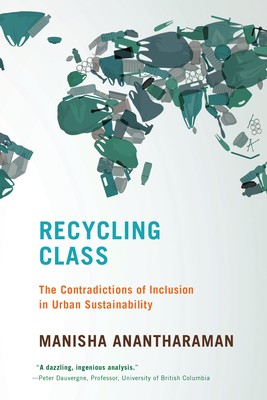
- We will send in 10–14 business days.
- Author: Manisha Anantharaman
- Publisher: MIT Press
- ISBN-10: 0262546973
- ISBN-13: 9780262546973
- Format: 15.2 x 22.6 x 2.2 cm, softcover
- Language: English
- SAVE -10% with code: EXTRA
Reviews
Description
An ethnographic and community-engaged study of the class, caste, and gender politics of environmental mobilizations around Bengaluru, India's discards. In Recycling Class, Manisha Anantharaman examines the ideas, flows, and relationships around unmanaged discards in Bengaluru, India, itself a massive environmental problem of planetary proportions, to help us understand what types of coalitions deliver social justice within sustainability initiatives. Recycling Class links middle-class, sustainable consumption with the environmental labor of the working poor to offer a relational analysis of urban sustainability politics and practice. Through ethnographic, community-based research, Anantharaman shows how diverse social groups adopt, contest, and modify neoliberal sustainability's emphasis on market-based solutions, behavior change, and the aesthetic conflation of "clean" with "green." Tracing garbage politics in Bengaluru for over a decade, Anantharaman argues that middle class "communal sustainability" efforts create new avenues for waste picker organizations to make claims for infrastructural inclusion. Coproduced "DIY infrastructures" serve as sites of citizenship and political negotiation, challenging the technocratic and growth-based logics of dominant sustainability policies. Yet, these configurations reproduce class, caste, and gender-based divisions of labor, demonstrating that inclusion without social reform can reproduce unjust distributions of risk and responsibility. Revealing the "win-win" fallacy of sustainability and foregrounding the agency of communities excluded from environmental policy, Recycling Class will appeal to scholars and activists alike who want to create a future with more transformative sustainability.EXTRA 10 % discount with code: EXTRA
The promotion ends in 18d.03:48:21
The discount code is valid when purchasing from 10 €. Discounts do not stack.
- Author: Manisha Anantharaman
- Publisher: MIT Press
- ISBN-10: 0262546973
- ISBN-13: 9780262546973
- Format: 15.2 x 22.6 x 2.2 cm, softcover
- Language: English English


Reviews